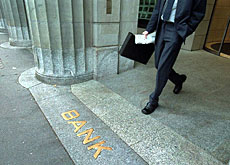Private bankers in battle for new clients

Switzerland’s private banks face surging global competition, regulatory assaults on banking secrecy, and a growing number of wealthy investors unhappy with “average returns”.
Those are the findings of a global survey of private banks by the financial services group, PricewaterhouseCoopers (PwC).
“Private banking clients are not happy,” Bruce Weatherill, a private banking expert at PwC, told swissinfo.
“They aren’t feeling very good about the investment community, they’re very worried about what’s happening to their wealth, and they’re worried about confidentiality and tax amnesties,” he said.
The irritability of private banking clients – often defined as “high-net worth individuals” worth more than $500,000 (SFr650,000) – is matched by the fact that the industry is becoming more competitive and international.
“There is a war for new clients,” Weatherill said.
For most of Switzerland’s private bankers, the findings will not come as a surprise.
According to the Swiss National Bank, funds managed privately in 2002 fell 13 per cent to SFr3 trillion.
Compliant
The industry has responded to the slump by streamlining itself, cutting costs and staff, and focussing on core markets.
Just last week, one of Switzerland’s oldest private banks, Ferrier Lullin & Cie announced a takeover of its fellow Geneva-based institution, Banque Notz Stucki.
In some cases, the shake-up has already borne fruit, with several banks reporting healthy profits in recent months.
But the banks will have more trouble defending their traditional competitive advantage over European rivals – banking secrecy.
Bodies such as the European Union, as well as the Organisation for Economic Development and Cooperation, have become involved in campaigns to weaken Swiss banking confidentiality.
Weatherill said Swiss banks would struggle to resist the pressure in coming years, although Switzerland was likely to remain an “acceptable off-shore banking centre”.
“That’s not to say there won’t be a Swiss compromise [on banking secrecy],” he said.
“What’s clear from the survey is that banks need to meet the base criteria for regulation internationally. If one doesn’t meet those, it’ll be very dangerous for the banks.
“The indication is that Switzerland wants to play in the international marketplace – so they’ll make themselves compliant.”
Courting the nouveau riche…
The survey, which covered over 70 countries, found most private banks were counting on seeing annual growth of between five and ten per cent in coming years.
However, with many banks expecting to receive only 17 per cent of that growth from new entrants to the “ultra-rich club”, institutions will find themselves competing among themselves.
Weatherill said this is because there has been little new wealth generated in recent years.
“The good news is that there is positive growth anticipated, but it’s down on the rates of ten and 15 per cent of a few years ago,” he said.
“But with fewer clients entering private banks, it’s a zero-sum game.”
..and keeping the old
Furthermore, many banks are busy fighting to keep their current clients. Angered by poor returns and higher fees, clients are looking twice at the performance of their family banker.
The number one reason cited by clients for leaving a bank is poor performance.
And long-gone are the days when the well heeled visited Zurich’s Bahnhofstrasse once a year en-route to a ski holiday. These days, clients demand constant attention.
“Clients over the past few years have been promised a lot of things by private banks,” Weatherill said.
“All of which has increased expectations on private banks which they’ve had a great deal of difficulty in meeting.”
swissinfo, Jacob Greber in Zurich
Private banks manage more than SFr3 trillion ($2.3 trillion) in Switzerland.
Globally more than $25 trillion is estimated to be in private banks.
UBS is the world’s largest private bank, with SFr1.3 trillion under management.
Private banks generally focus on clients worth more than $500,000.
Some specialise in “ultra-high net worth individuals” with assets upwards of $50 million.

In compliance with the JTI standards
More: SWI swissinfo.ch certified by the Journalism Trust Initiative










You can find an overview of ongoing debates with our journalists here . Please join us!
If you want to start a conversation about a topic raised in this article or want to report factual errors, email us at english@swissinfo.ch.